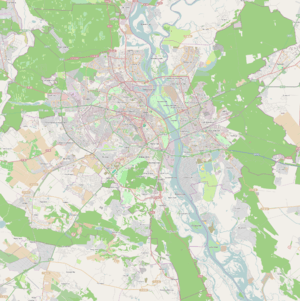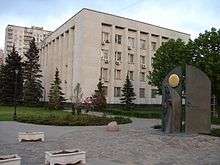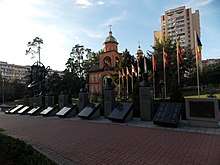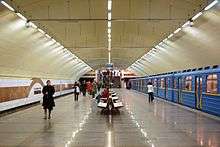Sviatoshyn
Sviatoshyn (Ukrainian: Свято́шин, romanized: Svjatóshin, IPA: [s⁽ʲ⁾wjɐˈtɔʃɪn]; also Свято́шино or Свято́шине) is a historical neighborhood and a suburb of Ukraine's capital Kiev that is located on the western edge of the city area, in an eponymous municipality.
Sviatoshyn Святошин | |
|---|---|
 Sviatoshyn Sviatoshyn within the Kiev city area | |
| Coordinates: 50°27′25″N 30°22′21″E | |
| Country City council Municipality | |
| First mentioned | 1619 |
| Time zone | UTC+2 (EET) |
| • Summer (DST) | UTC+3 (EEST) |
| Postal code | 03115, 03179 |
| Area code(s) | +380 44 |
Previously it was a dacha village (summer colony) in a pine grove which was included into the Kiev city council area in 1919.[1]
Location

The neighbourhood is located in the North-East of the Dnieper Upland, in the western a part of Kiev city's area.
The suburb is situated on the both sides of Kiev's prospect Peremohy along its western part. Sviatoshyn neighborhood borders the Nyvka River[2] (Borshchahivka River[3]) in the west, that flows through Sviatoshyn Ponds there and falls into the Irpin River of the Dnieper basin. There is the Sviatoshyn Forest Park beginning on the opposite side of the Nyvka River.
The east boundary of the suburb is the Kiev - Kovel railway. There are Bilychi, Akademmistechko and Aviamistechko neighbourhoods in the north of Sviatoshyn and Mykilska Borshchahivka neighbourhood, Skarbovyi forest terrain, Zhovtneve village and Petropavlivska Borshchahivka village in the south.
All Sviatoshyn's adjacent neighbourhoods and suburbs belong to the Sviatoshyn Raion as well, except Petropavlivska Borshchahivka village. That village is in the Kiev-Sviatoshyn Raion (municipality) of the Kiev Oblast (region).
By roads, the suburb is located:
- 13 km[4] to the Kiev city centre.
- 10 km[5] to the city's central station - Kyiv-Passazhyrskiy Railway station.
- 12 km[6] to Kyiv International Airport (Zhuliany)
- 44 km[7] to the main city's airport, Boryspil International Airport
The core Sviatoshyn road Peremohy Avenue is a part of European route E40, which is the main highway from Kiev to the most European countries. There is Highway T 1027 going through the suburb from north to south. It includes Academician Palladin Avenue and Great Ring Road there.
Name

There are two hypotheses of the name of Sviatoshyn existing.
The first one comes from a version that there was a Saint Grove (Sviatyi, Святий гай) in there. That was a sacred place for pagans.
The second version says that the name is derived from the nickname of the Prince of Chernigov Nikola Sviatosha,[8] who lived in the 12th century. His original name was Sviatoslav and he was a son of Davyd Sviatoslavich and a grandson of the Grand Prince of Kiev Sviatoslav II. It is alleged that he owned a land at neighbouring Borshchahivka village.[9] In 1106 the prince Sviatoslav donated all his property to the Kiev Pechersk Monastery and became a monk of it.[10] He took the monk Christian name Nikola (Nikolai, Ukrainian: Mykola, Микола). Since he had the born name Sviatoslav and was very devout he was given the informal nickname Sviatosha. Sviatosha means a pious, godly religious person.
In itself the Ukrainian word "Sviatoshyn" means "Sviatosha's", that is, something that belongs to Sviatosha.
Name's spellings

In contrast to English speaking countries, the names of a city's suburbs in Ukraine, that belong to city councils areas, do not have so strict spelling rules, because their name do not play any significant roles in an official city's division to local municipalities (raions) or in the postal system.
The ethnographer Lavrentii Pokhylevych in his work "Tales of inhabited areas of the Kiev province" in 1884 mentioned this place as "a woodland called Sviatoshyn".[11] There is a document "The report of the Committee to facilitate accomplishment of the villa area in the locality Sviatoshyn of the Kiev province and district. Kiev, 1903" existing.[12] At the beginning of the 20th century the dacha village was called Sviatoshyn (Святошинъ - in the Pre-reform Russian orthography).[13][14]
In the Soviet era there was a trend to change names of settlements, especially small ones, by putting the suffix "-o". So that since the 1930s on all maps of Kiev, both Russian and Ukrainian languages, the suburb was marked as Sviatoshyno (Святошино).[15] Settlement names with the suffix "-o" are more typical of Russian language than Ukrainian, so sometimes the name Sviatoshyne (Святошине) was used in Ukrainian spelling.[16] Despite of that there is Sviatoshyn (Святошин) article included in Kiev (Encyclopedic reference book) that was published by the Ukrainian Soviet Encyclopedia editorial office.[17]
Since the station of the Kiev Metro, which is the suburb's landmark, was renamed Sviatoshyn (Святошин) station, this variant of suburb spelling has been started broadly used. Ukrainian linguists insist on using Sviatoshyn (Святошин) as the locality name.[18][19] In spite of this, sometimes the name Sviatoshyno (Святошино) has still been used, even in official documents of the Kiev City Council.[20]
History
Early time
Before the Kievan Rus epoch it was a territory of Eastern Polans and approximately 10 kilometres to the west, on the left bank of the Irpin River Drevlians' land began.[21]
At the time of Kievan Rus and the Grand Duchy of Lithuania the land belonged to the Principality of Kiev.
It is alleged that in the 12th century the owner of this land was the Prince of Chernigov Nikola Sviatosha (Sviatoslav), who donated it to the Kiev Pechersk Monastery. Until the beginning of the 17th century this area belonged to Kiev monasteries.[22]
The first mention of the area name Sviatoshyn was in 1619, when this land was a part of the Kiev Voivodeship of the Crown of the Kingdom of Poland of the Polish–Lithuanian Commonwealth after the Union of Lublin. At that time the king Sigismund III Vasa determined the metes and bounds of Kiev's burgesses land possession in his charter. In particular it was said that Kiev's citizens boundary went "through an oak grove to Sviatoshyn side".[8]
At the time of the Cossack Hetmanate, the present Sviatoshyn territory belonged to the Kiev Regiment.
In the 1780s, at the time when this land was included into the Kiev Viceroyalty of the Russian Empire, the Magdeburg rights of Kiev were revoked so Sviatoshyn area went to the state ownership.
Until the end of the 19th century, that land had been mentioned like Sviatoshyn wood, grove or forest, and it was a part of the Bilychi volost of the Kiev Governorate. There were no allusions about any permanent human settlements in there at that time.[23]
Dacha village
In 1897 the Sviatoshyn land, which had been occupied by a pine grove, was divided into 450 lots and leased for 99 years. Thus а dacha village (summer colony) was set up there.
A grid plan was implemented in the village. That area master plan is typical of dacha summer settlements. The core road of Sviatoshyn was Brest-Litovsky highway, now Peremohy Avenue, that went from east to west dividing the village into two unequal parts.
|
|
|
|
|
|
- A prosika (Ukrainian: просіка, Russian: просека, (old: просѣка)) means a narrow straight glade in a forest, in which trees have been cut down for further road laying or other business purposes.

The villa projects were created by the Kiev architects Alexander Krivosheiev and Alexander Khoinatsky. A lot of powerful, influential and rich people had villas there. In particular, villa owners were Kiev University professors, three Kiev mayors, businessmen including members of the "sugar magnate" Tereshchenko family.
The popularity of the villa area was growing up because of a pine grove, a pond and a good transport infrastructure. Simultaneously with developing the land area, in 1898 a narrow-gauge railway was laid from Kiev and it was used as a horsecar tram line then steam tram-cars operated there. In 1901 the village was connected to an electricity network so on the 1st of May that year electric trams were launched. In 1902 Kiev - Kovel railway, which goes along the east edge of Sviatoshyn village, was finished up building and Sviatoshyn Railway Station was opened.
In 1911 one of the oldest Kiev's cinemas Ekran (screen) was opened at the corner of Brest-Litovsky Highway and the 3rd Prosika.
Between the village and Syrets suburb was Sviatoshyn Airfield where the pilot Pyotr Nesterov introduced his famous aerobatics flights.
In 1919 the village was included into the Kiev City Council area.
Gallery
- Some saved old villas
_%D0%86._%D0%9C._%D0%94%D1%8C%D1%8F%D0%BA%D0%BE%D0%B2%D0%B0.jpg)


Soviet era


As a result of the Ukrainian–Soviet War (1917–1921) and the Polish–Soviet War (1919–1921) Kiev City and its suburbs was finally captured by the Red Army. In 1921 Bolsheviks conducted the administrative subdivision reform, so Kiev was divided into 5 raions (districts) and Sviatoshyn was included into the City Council area permanently.
The Bolshevik government was conducting the nationalisation policy so that many dacha villas were expropriated. The best villas were transferred to state and trade unions sanatoriums, boarding schools and Young Pioneer camps. Some other villas and cottages were converted to communal apartments. In practice it means that a house owner family was left just one bedroom, a rest of bedrooms were given to other families, which usually originated from the working class. A kitchen room and a bathroom were used by all families together, that lived in a house.
In the 1930s Sviatoshyn's St. Nicholas Eastern Orthodox church was demolished by Bolsheviks.[24] However, on the south-west edge of Sviatoshyn the Roman Catholic parish of the Exaltation of the Holy Cross was existing during the whole time of the Communist rule. It was only one the refuge for Roman Catholics in all Kiev region.[25]
In 1941 during the Second World War, the general staff of the Kiev Fortified Region was situated in place of present Kiev secondary school No. 140.[26] and next to it, the operational team of the command post of the Southwestern Front was located at the modern address 80 Verkhovynna Street. In 1944-1945 the training centre of Soviet partisans (guerrillas) located in the house at 10 the 2nd Prosika. There are a complex of monuments at Soviet soldiers' graves who killed in battle of Kiev in 1943 at the Sviatoshyn Cemetery.
At the end of the 1940s Sviatoshyn Airfield was passed to ownership of an aircraft serial production plant that since 1952 has been headquarters of Antonov state company. In 1988 the company produced the largest ever aircraft Antonov An-225 Mriya. Together with the aircraft factory development the new village Aviamistechko began being built next to the north-east edge of Sviatoshyn. The name Aviamistechko (Ukrainian: Авіамістечко, Russian: Авиагородок) means "aviation town". Sometimes this locality has been called Novosviatoshyn (New Sviatoshyn) as well.
In 1947 the clothing factory "Kashtan" was launched;[27] it was one of the biggest producer of men's shirts in the USSR.[28]
Late in the 1950s the new housing estate Akademmistechko was started building on the land of the former vegetable farm "Sviatoshyn", that had been located north of the neighbourhood. Besides residential buildings there have been numerous research institutes of Ukrainian Academy of Sciences situated in there. Therefore, the suburb got the name Akademmistechko (Ukrainian: Академістечко, Russian: Академгородок), which means "academic town".
In 1971 Sviatoshyn(o) station of the Kiev Metro was opened on the east edge of neighbourhood, next to the same name railway station.
At the beginning of the 1970s a new housing estate of tower blocks was begun erecting in the north-west part of Sviatoshyn and south-east part of Bilychi suburbs, for that all existing former dacha houses had been demolished in there. In 1979–1980 the Ukrainian poet and Soviet political prisoner Vasyl Stus was living in apartment building at 13-a Chornobylska Street in that housing estate.
In 1982 due to increasing number of traffic lanes of Brest-Litovsky Highway, Sviatoshyn tram line was dismantled.[29] Instead of trams, trolleybuses were launched to the neighbourhood.
Memorial to Chernobyl disaster victims

The memorial to Chernobyl disaster victims is located in a landscape park at the intersection of Chornobylska Street and Peremohy Avenue. The memorial is devoted to people who were killed, injured and suffered because of the Chernobyl disaster in 1986.
The monument to victims of that tragedy was erected at the initiative of the "Chernobyl Disabled Union" on 26 April 1994, with funds of the local budget and private donations. Authors of the monument are the sculptor Volodymyr Chepelyk and architect Mykola Kyslyi.[30]
In 2001 the St Theodosius of Chernihiv church and in 2002 the bell tower museum were built at the monument.
In 2011 the memorial avenue "Heroes of Chernobyl" was created at the initiative of "Chernobyl Fire-fighters" NGO.[31] There were erected seven busts of firemen, heroes of Ukraine and the Soviet Union and installed eight memorial plates in memory of died Chernobyl disaster liquidators.[32]
Vasyl Stus Garden Square
Vasyl Stus Garden Square is located at the corner Academician Palladin Avenue and Peremohy Avenue. It is named after the poet and political prisoner Vasyl Stus, who was one of the most significant members of the Ukrainian cultural movement of the sixtiers. He was living near this place at 62 Lvivska Street, since his marriage in 1965 to the first arrest in 1972. The house was demolished in 1979 due to building the road interchange there.[33]
In 2006 at the initiative of the Ukrainian People's Party and Green World NGO,[34] a local community meeting was conducted, it was decided to establish Vasyl Stus garden square. The initiative coordinator was Viktor Tkachenko. In March 2007 the Kyiv City Council supported this initiative and local volunteers including students of schools 140 and 200, clean up the plot on Earth Day. However, in 2008 the Kiev City State Administration gave a building permit for shopping centre construction here. Thus the building developer cut down more than 100 trees including oaks older than 120 years and pines older than 150 years.[35] The litigations began between parties.[36]
Finally in 2010 the Kyiv City Council assigned "Vasyl Stus" name to this plot but in fact the garden square was opened on Kiev Day of 2015[37] by the mayor of Kiev Vitali Klitschko. There were Vasyl Stus's widow and his sister, who was a refugee from the Donetsk Oblast because of the war in Donbass, granddaughter, friends-sixtiers, public activists and local community residents present in the ceremonial unveiling of the garden square.[38]
Transport

Sviatoshyn Railway Station is a point which all electric multiple unit trains go through from Kiev towards the North-West direction.[39] Some passenger trains that run to Western Ukraine stop at Sviatoshyn station.[40]
There is the bus station "Dachna" located at 142a Peremohy Avenue. Buses to European countries and Western Ukraine set off from here.[41]
The Sviatoshynsko-Brovarska Line of the Kiev Metro is laid underground in the neighbourhood. Zhytomyrska Metro station, opened on 24 May 2003, is situated in the centre of Sviatoshyn. Sviatoshyn station, built in 1971, is on the eastern edge of the suburb. Akademmistechko station, opened in 2003, is located at the border Bilychi and Akademmistechko neighbourhoods near the north side of Sviatoshyn.
The suburb is connected to other neighbourhoods by Kiev's municipal buses and trolleybuses.[42]
There is an airfield Sviatoshyn Airfield where is located Antonov Serial Production Plant, formerly Aviant.
External links
- Information about the area - The local government of Sviatoshyn Rayon // (Ukrainian: Відомості про район - Святошинська районна в м.Києві державна адміністрація)
- Some photos of old Sviatoshyn cottages // (Ukrainian: Святошинські дачі, Україна Інкогніта)
See also
References
- Sviatoshyn summer colony village // Historical report of Kiev's monuments - Ukrainian: Святошин Дачне Селище // Звід Історїї Памяток Києва
- Hydroecology of the Nyvka River, the current state, and escapes from environmental risks.
Ukrainian: Гриб Й. В. - Гідроекологія р. Нивка: сучасний стан та виходи із екологічних ризиків, Ситник Ю. М., Борбат М. О. (2010) - History of Petropavlivska Borshchahivka village
Ukrainian: Історія села Петропавлівської Борщагівки - 13 km
- 10 km
- 12 km
- 44 km
- "Kiev, Encyclopaedic reference book". Kiev. 1981
Ukrainian: «Київ. Енциклопедичний довідник» УРЕ, Київ-1981 - Unknown and neglected pages of Kiev History, page 17 (10) // M. O. Rybakov
Ukrainian: Невідомі та маловідомі сторінки історії Києва, М. О. Рибаков - Kiev Pechersk Patericon // About Reverend Sviatosha, the Prince of Chernigov
Ukrainian: Патерик Києво-Печерський. Про преподобного Святошу, князя Чернігівського, Слово 20. - Tales of inhabited areas of the Kiev province 1884, page 15 (23)
Russian: Сказанія о населенныхъ мѣстностяхъ Кіевской губерніи - The report of the Committee to facilitate accomplishment of the villa areas in the locality Sviatoshyn of the Kiev province and district
Russian: Отчет Комитета Общества содействия благоустройству дачной местности в урочище "Святошин" Киевской губернии и уезда... - Search RSL - Military Topographic Map of the Russian Empire 1846-1863
Russian: Военно-топографическая карта Российской Империи 1846-1863 гг. - Old photographs of Sviatoshyno // Photos of Kiev on a map
Russian: Старые фотографии Святошино, Фото Киева на карте, Киев - retroua.com - Sviatoshyn (Kiev, Ukraine) - Maps of land - descriptions, photos
Russian: Святошин (Киев, Украина) - Карты местности - описания, фото - Vol 7, Encyclopedia of Ukraine
Ukrainian: Енциклопедія українознавства. Словникова частина. Том 7 - Kiev: the encyclopedic reference book / ed. A.V. Kudrytskyi - 2nd ed. - K.: Ch. Ed. Ukrainian Soviet Encyclopedia, 1985. - 760 pages // 555 page
Russian: Киев: энциклопедический справочник / под ред. А. В. Кудрицкого — 2-е изд. — К. : Гл. ред. Украинской Советской Энциклопедии, 1985. — 760 с., ил. - Creation and using of possessive adjectives // The Ukrainian language official site
Ukrainian: Творення і вживання присвійних прикметників // Офіційний сайт Української мови - Nobody in the world does not speak the literary language // News on Gazeta.ua
Ukrainian: Ніхто у світі не говорить літературною мовою, Новини на Gazeta.ua - Kiev City Council // Proceedings #5 18.03.2015
Ukrainian: КИЇВСЬКА МІСЬКА РАДА, Протокол №5 18.03.2015, Постiйнi комiсiї - The origin, distribution and social order of the Slavs in VI - IX centuries. - History of Ukraine // Online study materials
Ukrainian: Походження, розселення та устрій слов'ян у VI - IX ст. - Історія України - Навчальні матеріали онлайн - Kiev. The short toponym guide
Ukrainian: Пономаренко Л. А., Різник О. О. Київ. Короткий топонімічний довідник. Довідкове видання. — К. : Видавництво «Павлім», 2003. — 124 с. : іл. — ISBN 966-686-050-3 - Plan of Kiev outskirts, 1850
Russian: Планъ окрестностей Кіева, 1850 - A workshop on the revival of St. Nicholas church in Sviatoshyn district. // Ukrainian Orthodox Church – Kyiv Patriarchate (UOC-KP)
Ukrainian: Відбулася робоча нарада з відродження Свято-Миколаївського храму в Святошинському районі м. Києва - Order of Barefoot Carmelites in Kiev
Ukrainian: Орден Босих Кармелітів в Україні — Босі Кармеліти у Києві - History of Kiev secondary school No. 140
Ukrainian: Історія - Cередня загальноосвітня школа № 140 Святошинського району м. Києва - Kashtan, Kiev garment factory - Encyclopedia of Modern Ukraine // © 2014-2016 the NASU Institute of Encyclopaedic Research
Ukrainian: Каштан Київська швейна фабрика - Енциклопедія Сучасної України // ©2014-2016 Інститут енциклопедичних досліджень НАН України - "Dilovyi Visnyk" (Business Journal), 2005, #6 (133), p. 14, ISSN 1680-3310
Russian: «ДЕЛОВОЙ ВЕСТНИК (Діловий вісник)», 2005, № 6 (133), с. 14, ISSN 1680-3310 - Stefan Mashkevych // History suburban of Kiev tram lines. Sviatoshyn tram
Ukrainian: Стефан Машкевич // Історія приміських трамвайних ліній Києва. Святошинський трамвай - Memorial. Sviatoshyn Raion government
Ukrainian: Меморіальний комплекс - Святошинська районна в м.Києві державна адміністрація - The memorial avenue "Heroes of Chernobyl" was opened in Kiev // Government portal.
Ukrainian: Урядовий портал // У Києві відкрито меморіальну алею "Героїв Чорнобиля" - Chernobyl liquidators have been commemorated in Kiev // The Ukrainian Week.
Ukrainian: У Києві пом’янули чорнобильців - Новини - Український тиждень, Тиждень.ua - In defense of Vasyl Stus Garden Square // Ukrayinska Pravda
Ukrainian: На захист скверу імені Василя Стуса // Українська правда - Київ - A long path to Stus // The Day newspaper
- Kiev without Stus? // Ukrayina Moloda
Ukrainian: Київ без Стуса? // Україна Молода - Regulation no - Affairs of the from resolution about software justice, to the particular disputes that in:. - Shramko Yu.T. - 27.2.2013 - Cases.legal // «about appropriation skveru Basil Stus»
- In Kiev on the place of the scandalous construction site, Vasyl Stus Garden Square has been opened. // Radio Free Europe/Radio Liberty
Ukrainian: У Києві на місці скандальної забудови відкрили сквер імені Василя Стуса - Vasyl Stus Garden Square has been opened in Kiev (photo, video) // Segodnya
Ukrainian: У Києві відкрили сквер імені Василя Стуса (фото,відео) - Комунальники встановили лавки, посадили квіти і посіяли траву // СЕГОДНЯ - Timetable of the station Sviatoshyn
- Timetables :: Passengers :: The official website of Ukrainian Railways
- "Dachna" bus station // Timetable
Ukrainian: Автостанція "Дачна" Київ – Розклад автобусів – busfor.ua - Routes of buses, trolleybuses, trams, timetables, Kiev // Portal of journalists.
Ukrainian: Маршрути автобусів, тролейбусів, трамваїв, розклад руху, Київ - Портал журналістів